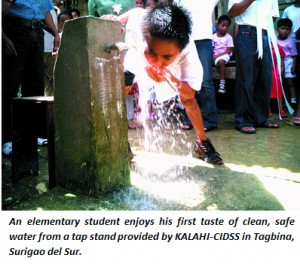 BUTUAN CITY – One hundred forty (140) barangays from 15 municipalities in Caraga region have benefited from a total of P120.7 million worth of infrastructure projects from the Kapit-Bisig Laban sa Kahirapan – Comprehensive and Integrated Delivery of Social Services (KALAHI-CIDSS) implemented by the Department of Social Welfare and Development (DSWD).
BUTUAN CITY – One hundred forty (140) barangays from 15 municipalities in Caraga region have benefited from a total of P120.7 million worth of infrastructure projects from the Kapit-Bisig Laban sa Kahirapan – Comprehensive and Integrated Delivery of Social Services (KALAHI-CIDSS) implemented by the Department of Social Welfare and Development (DSWD).
Infrastructure projects ranging from water systems, road rehabilitation, and footbridges to health stations, school buildings, and day care centers have ensured that deprivation of social services in far-flung areas is addressed.
“The department has successfully turned-over 140 infrastructures or sub-projects to the respective local government units who availed of the regular KALAHI-CIDSS and the performance incentive Makamasang Tugon,” DSWD Caraga regional director Mercedita P. Jabagat explained.
Thirteen (13) municipalities in the region implemented Makamasang Tugon while two other towns were part of the regular KALAHI-CIDSS modality. Community activities ran for one year to carry out the project’s objectives of empowering communities, improving local governance, and reducing poverty.
KALAHI-CIDSS is the flagship anti-poverty project of the government through DSWD that employs the community-driven development (CDD) strategy that guarantees social accountability gives grassroots communities the power to decide for themselves what projects to implement.
Aside from the funds provided by the DSWD, a counterpart scheme was also put in place wherein the LGUs in the barangay, municipal, and provincial levels contribute funds to carry out expenses for the operational costs and conduct of capability-building trainings that amounted to P28.78 million.
“The project doesn’t only provide infrastructures to these communities but more importantly, it creates a pool of volunteers who will steer development in their towns and this is done through the technical assistance extended to them in trainings and workshops,” Jabagat added.
DSWD is concluding its three-year KALAHI-CIDSS engagement to each municipal local government units (MLGUs) for most of these areas.
“The department’s development assistance to the most vulnerable and deprived areas in the country continues. We are nearing our completion of disbursing the remaining grant of the project and hopefully next year, KALAHI-CIDSS 2 or the National Community-Driven Development (NCDD) program will begin,” Jabagat concluded. ### (Social Marketing Unit)

